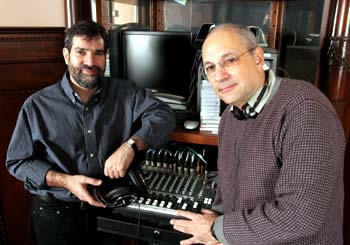The following is an article from the Penn Current. It is also available here.
POETRY/A new sound archive brings poems off the page and into your headphones.
Hearing voices
English professors Al Filreis (left) and Charles Bernstein in the studio they set up to convert tapes and CDs of poetry recordings into user-friendly MP3 files.
Photo credit: Mark Stehle
Poets, says Al Filreis, are a technologically savvy bunch. That’s one reason the Penn English professor is so optimistic about PennSound, the web-based sound archive he’s created with fellow English professor Charles Bernstein that makes MP3 files of poetry readings available to anyone who cares to download them.
Launched on Jan. 1, PennSound (www.writing.upenn.edu/pennsound) features readings from Kelly Writers House, SUNY Buffalo (where Bernstein taught before he came to Penn) and other venues from Vancouver to Brooklyn. The archive also includes rare recordings never before available, many of them collected and recorded over the years by Bernstein himself.
PennSound works very much like a music-downloading site. Because the poetry readings are broken up into single poems, which range from about three to seven minutes—the same length as a typical song—they’re easily downloadable to MP3 players, iPods or a computer desktop. The difference is the PennSound downloads are free. “We’re setting ourselves up as an alternative to the music industry’s proprietary, greedy approach,”says Filreis.
Filreis sees the site as an outreach tool, too. He hopes to capture the interest of some of the “vast population of people who are starting to enjoy music this way, controlling their own sound, choosing their own menu of songs.” Some of that population, he’s certain, could become interested in poetry too, if they were “awakened to the sound of the poet’s voice outside of the classroom.” Bernstein sees the performance and printing of a poem as complementary. “Each has a different potential, as well as limitations. Listening is a crucial component of our understanding of what the work is.”
Filreis says his own experience using PennSound has been surprising. “The other night,” he says, “I made a nice dinner for my kids and it was clearly going to take a while to wash the dishes. Instead of listening to NPR … I listened to Ted Barrigan reading his sonnets from 1981. I had read them but never heard them. I don’t think I’d really appreciated them before, and I’m a teacher of contemporary poetry. By the time I was done, I was looking around for more dishes to wash because I had just spent 45 minutes being really, really stirred and moved.” Among Bernstein’s favorite recordings is the late Scottish poet Hugh MacDiarmid reading from his epic poem series, “A Drunk Man Looks at the Thistle.” Here, he says, the audio component is vital. “It’s in a Scot’s dialect,” explains Bernstein. “If you try to read it, it’s in unfamiliar looking English and you wouldn’t have any idea how it sounds.”
Michael Ryan, director of Penn Library’s Schoenberg Center for Electronic Text & Image, has been working with the English professors to create an advanced cataloguing tool for PennSound. That’s still a work in progress, but when it’s up and running, says Bernstein, users will be able to search for any term that interests them, including, for example, poetry readings in San Francisco in 1962.
“There’s so much more to come, this is just the tip of the iceberg,” says Filreis, who acknowledges that much of what is currently on the site is there because the files were in their possession and permission had already been secured. “But we’re curating this, and what we’re looking for is stuff that will charm people and strike them as unique.”And, presumably, make poetry lovers of us all.

